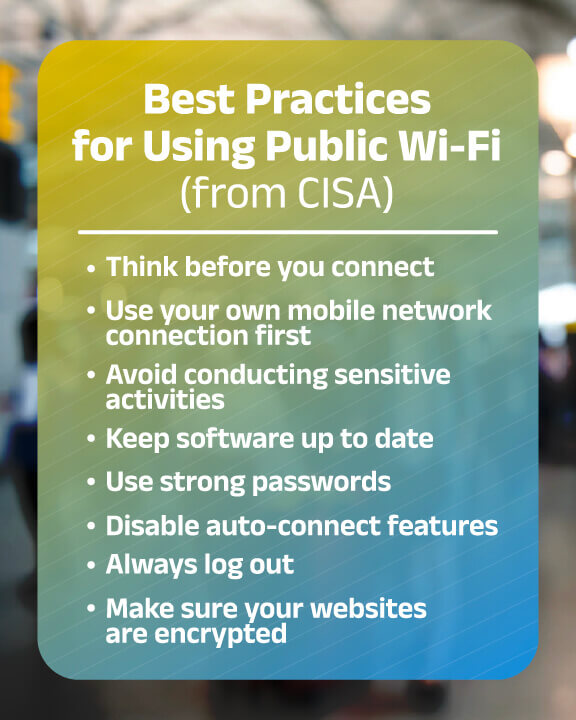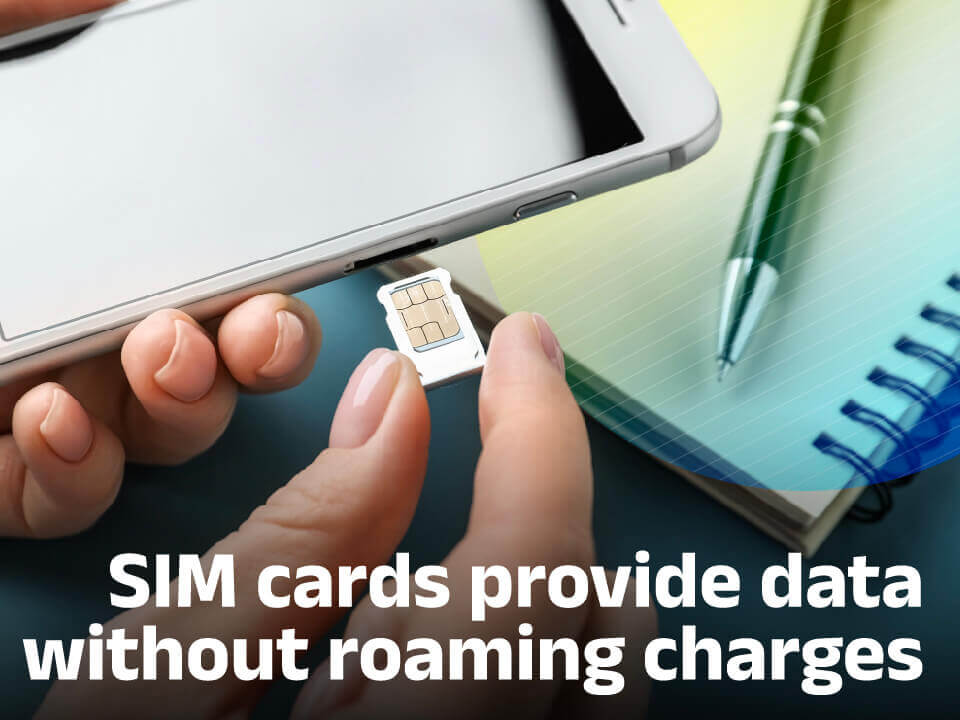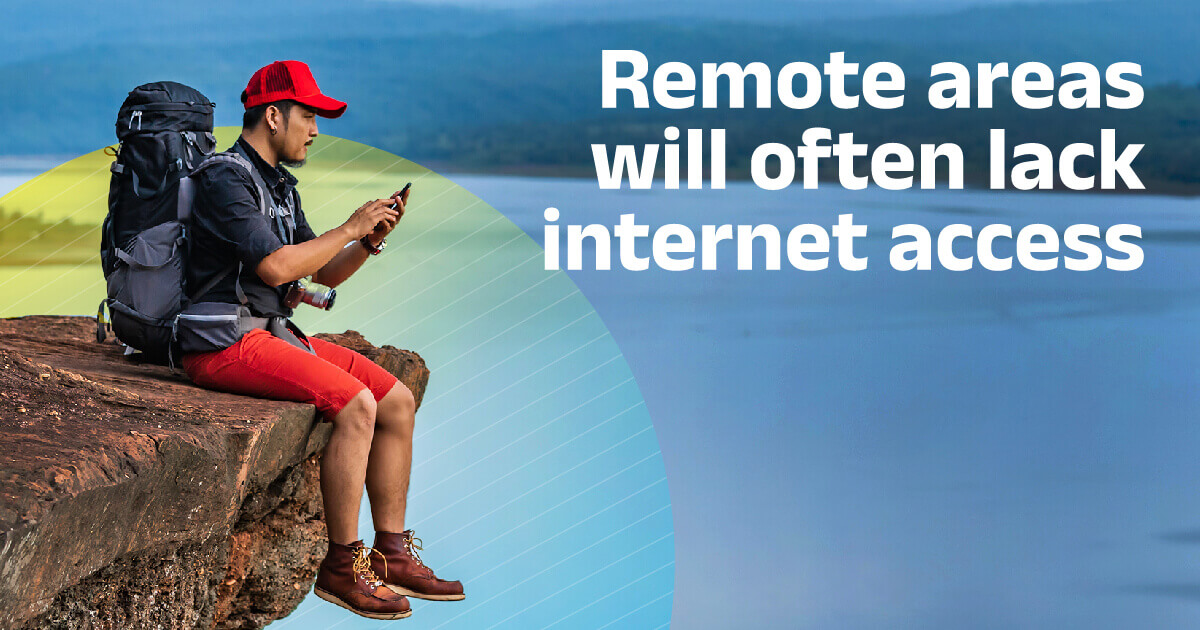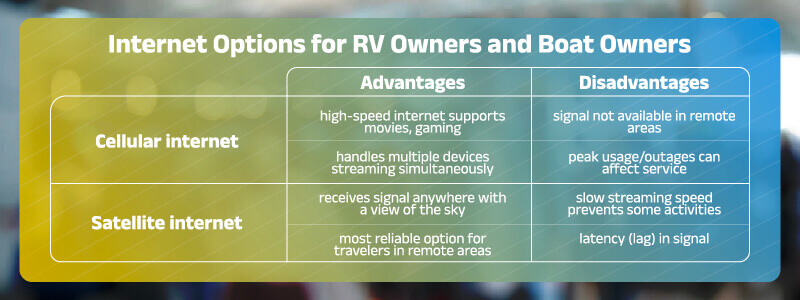Lower your internet bill
61% of people overpay for their internet.
Are you one of them?
Unlock exclusive offers in your area!
Call now
[tel]Enter zip code
1 Star is Poor & 5 Stars is Excellent.
* Required

Written by Rosslyn Elliott - Pub. Dec 12, 2022 / Updated Mar 18, 2024
Table of Contents
Are you happy with your Internet service?

About the author
Internet access has transformed travel with helpful information only a click away. When you’re traveling, an internet connection can supply you with maps, resources, and assistance. Getting online can often be even more important to you as a traveler than when you’re at home.
In this guide, you’ll learn ways to get on the internet no matter where you’re headed. Maybe you’ve just landed your first remote work position, and you’re going to hit the road with your laptop. Maybe you’re a student traveling for a semester abroad in Europe. Or maybe you’re just taking a much-deserved vacation to sit on the beach sipping a cold drink. Here’s an easy summary of all the best options for how you get internet while traveling.
No matter what your travel budget is, you can find free Wi-Fi in many places in countries all around the world. Most people know that some of the best spots for free public Wi-Fi are coffee shops, bars, and restaurants. But there are more options for you when you’re traveling and you need to save money. Airports, bus terminals, university campuses and hospitals also have networks you can access at no charge. Some government facilities provide free Wi-Fi.
Even budget hotels now usually offer free Wi-Fi as an amenity with your room rental. So, if you are staying in hotels, don’t underestimate the benefit of those hours of free Wi-Fi! A hotel’s free internet portal can be a valuable home base where you can find out what’s going on in the area and plan your daily activities.

Public libraries are in a category all their own when it comes to resources to help you get online while traveling. Libraries offer free Wi-Fi, and they also provide free computer access. You can get a loaner laptop or tablet that you can carry around the library with you for convenience while browsing. Instead of sitting at a desk, you can sit in a comfy chair and listen to music or a video through headphones. Public libraries also offer free or low-cost printing services. If you work on the road or you just need to send in some forms, libraries are a perfect solution. Libraries can be a one-stop shop where you can get internet access along with many other free resources.

What’s not to love about free public Wi-Fi? Though it can be a wonderful boon to the budget, public Wi-Fi networks bring security risks. Most people have heard at least a few tips about how to stay safe when using public Wi-Fi. The FCC offers even more specialized security tips for people traveling abroad.
Another way to keep your personal information safe when you are using public Wi-Fi is to get your own travel router. These devices will turn public Wi-Fi signals into your own private Wi-Fi network. If you plan to use a lot of free public Wi-Fi, consider getting a travel router or a VPN to keep you safe online.
When you’re abroad, remember that just like your home country, many countries will offer public Wi-Fi hotspots where you can get online.
For travelers only going on short-term international trips, it may be easiest and least expensive to use public Wi-Fi for your internet access. Those public Wi-Fi hotspots can be a lifesaver. They can help you avoid some of the challenges of trying to make your data access portable when you’re traveling in foreign countries.
Crossing international borders can be a big challenge to getting internet while traveling. Carriers and infrastructure will be different in every country. Using roaming data on your smartphone can become extremely expensive. You do not want to be charged at international roaming rates!
But don’t let the obstacles to international internet access intimidate you. Staying connected while traveling internationally can also be quite simple when you know all the options.

Some major ISPs will provide their subscribers with an international plan for a daily fee. That plan will save you money compared to standard international data roaming rates. The provider may text you on your smartphone after you land in a foreign country to offer you the option of enrolling in their international plan. Be aware that this plan is likely to be more expensive than several other internet options for international travelers. Such plans also can come with data caps that will be lower than data limits for other plans. Carriers such as AT&T and Verizon, for example, charge about $10 a day for their international data plans. SIM cards can offer significant savings from that rate.
For long-term travel, you may want the ability to get online without going to a public Wi-Fi hotspot. Even for some short-term trips, you may feel more comfortable if you can get an internet connection at any time.
Getting a SIM card is one popular solution. SIM cards give you mobile internet access without international data roaming charges.
A SIM card looks like the microSD card in your smartphone that you switch into a new phone when you upgrade. The SIM card is the tool that connects you to a mobile network. By changing out a SIM card, you can use an affordable mobile internet network at your international destination.
You can choose an international SIM card or a local SIM card based on which is the best internet option for the country where you are headed. Some countries make it almost impossible for nonresidents to get local SIM cards. But most countries have tourist SIM cards that are prepaid and very easy to use.
1) If you are planning to use a SIM card in your cell phone, you will need to make sure your phone is unlocked. Your carrier can unlock your phone in many cases. Or, you can unlock your smartphone yourself on some websites that specialize in unlocking smartphones.
2) SIM cards come in Standard, Micro, and Nano sizes. Some cards known as 3-in-1 are designed to work for all three sizes. Make sure you know which size your device will require if the SIM card you need is not available as a 3-in-1.

First, you may want to check the prices for international SIM cards for your destination. International SIM cards will be more expensive than a local SIM card. But any kind of SIM card is still far less expensive than international roaming charges.
Some international SIM cards supply data only and don’t support phone calls or text messaging. A second variety of international SIM card will support data and texting. Other cards will provide all three: data, SMS, and cell phone service. But cards that support voice calls and texting tend to have more limited geographical ranges. A card that supports voice and text may work in fewer countries than a data-only international SIM card.
If you will be traveling to several countries on your journey, the international SIM card will work across those borders. For multi-country travel, you may want to check your email or send photos as you are traveling across Europe or Asia. International cards will offer unmatched convenience for you if you are planning a complex trip.
Every time you cross a border, an international SIM card will create a local number for your phone that is based in the country you have just entered. That new local number means that your data usage is no longer charged at international roaming rates. That technology makes the international SIM card a great choice for many global travelers.
International SIM cards are available online, which makes it easy for you to compare your options for travel internet access. eSIM cards can even be emailed to you, as they work through software installation rather than a physical card.
You can buy a prepaid local SIM card in advance of your trip from online retailers. Or, you can buy a local SIM card when you arrive in your destination country. Local SIM cards will often provide you with the cheapest way to enjoy full internet access while traveling.
Most countries will offer local SIM cards in their major cities at airports, newsstands, and convenience stores. Frequent travelers often recommend buying at local stores rather than airports, as airport prices tend to be higher.
The advantage of buying at an airport, however, is that you will be more likely to avoid a flawed or fake local SIM card. An official internet service provider kiosk in an airport is a trustworthy place to buy a local SIM card in a foreign country.
It’s time to pull on those hiking boots or slide on the flip flops and have a few days of fun in your home country.
In most tourist-friendly regions, you will be able to get internet access at your vacation site. A hotel or a beach rental property will often provide free Wi-Fi to its guests. But remote areas such as mountain camping sites will often lack internet access. Remote areas are beyond the strong range of signals from cellular towers. You may get a weak signal, but it won’t be enough to get online.

So how long will you be on vacation? If it’s just a few days, maybe you’re looking forward to going off grid. But maybe you’re the kind of traveler who wants all your comforts at once, including internet access.
Maybe you know you’re going to stay in a place where there’s only one bar of cellular signal. You still want internet access, for safety and entertainment. You and your family or friends want a solution to be able to use your smartphones, laptops or tablets.
In that case, you might consider using a mobile hotspot device with a booster. The booster will boost the weak wireless signal so it becomes a usable two bars or more. The mobile hotspot device also allows you to connect multiple devices at once. Several people could then use their tablets, phones, or laptops at the same time.
If you don’t want to commit to the upfront cost of a mobile hotspot device before you know how it works, you can rent one. For a short trip, renting a portable hotspot is a great way to find out whether it serves your needs. Most offer standard 4G speeds (depending on your signal, of course), but many will also set a data cap of 1 GB (gigabyte) per day.
RV owners, VanLifers, and boat owners have a unique challenge. The special capabilities of their vehicles can take them far away from cellular towers. They also may spend long periods of time out of reach of public Wi-Fi hotspots like coffee shops and restaurants.
The best internet options for RV owners, VanLifers and boat owners will vary widely. For people who take shorter trips in their RVs, some internet options for travelers such as mobile hotspots might be perfect. But other RV owners venture farther out to remote areas for a full season. Some live year-round in their vehicles and boats, And more and more are doing full time remote work using the internet while they’re on the road. For all these people, the most popular solutions are often portable cellular modems or satellite service.
Cellular modems and satellite service have their pros and cons, depending on the individual lifestyle. Boat owners, for example, may be far from shore for hours at a time, completely beyond any signal. Satellite may be the only reliable connection for internet access for their boats.

See our guide for more specifics on the best internet options for an RV or VanLife.
Many cars now have built-in Wi-Fi hotspots, which is great if you like to stay on the road. If you drive all over your state for business, for example, it’s fantastic if your company car has a portable hotspot. You may need to pull over to use it safely, but you know you have a reliable connection.
Built-in Wi-Fi hotspots can be a boon for parents. Young people need entertainment when they’re stuck in a car for hours. Many built-in automobile hotspots can handle 4 to 10 devices at once. Kids and teens with different tastes can stream different videos using their headphones. And if one parent has to work while another drives, the mobile hotspot can help the remote worker as well.
Vehicle cellular signal boosters may also help road warriors keep a consistent signal. For those who are using their smartphones rather than a hotspot, a vehicle signal booster might be a good choice.

The most important issue is whether you will be able to recharge your portable devices. There are 15 different types of plug used around the world. Make sure you do your research on the places you’re traveling. You need to know what kinds of recharging adapters might be necessary. In some cases, an international wall charger may be your easiest solution.
When you first buy your smartphone, many service providers will lock your phone so it will only work on that one provider’s service. If your smartphone is locked, you will need to get it unlocked to put in a SIM card for international internet access.
If your smartphone is paid off or you pay an early termination fee, your carrier is legally required to unlock your phone for free. Some websites will help you unlock your phone by entering a code.
Unlocking your own phone has been legal since the Unblocking Consumer Choice and Wireless Competition Act of 2015. Still, be careful. Some phone-unlocking services are fraudulent, so do your homework before sending any payment.

In most countries, you will face high charges for international phone calls. You’ll pay those rates just for placing a voice call without any use of data. Check this table of international calling rates from the FCC. Note that some carriers offer worldwide “value calling" plans that offer considerable savings by the minute for a flat monthly fee.
In some plans with major carriers, you may still be able to “call home" at reasonable rates when you are overseas. For example, say one smartphone with an American area code is calling another with an American area code. In that case, some providers may not assign any international charges even when one phone is in a different country. When you take some smartphones from the USA abroad, American callers don’t even have to dial international area codes to reach your phone.
As you can see, international plans vary widely. It is important to take into consideration how internet access affects cell phone choices for international travelers. Make sure you understand how you are going to use your smartphone while traveling and what rates your current provider might charge you.
Data-only SIM cards will not support voice calls. To make your smartphone work for calls, you would have to take out your international SIM card and insert your old SIM card. In that case, you would still be charged international calling rates.
Those high charges are why many international travelers download services like WhatsApp. Keeping in touch while traveling can often be more budget-friendly when you use data instead of voice calls.

About the author
Congratulations, you qualify for deals on internet plans.
Speak with our specialists to access all local discounts and limited time offers in your area.
[tel]61% of people overpay for their internet.
Are you one of them?
Unlock exclusive offers in your area!
Call now
[tel]Enter zip code